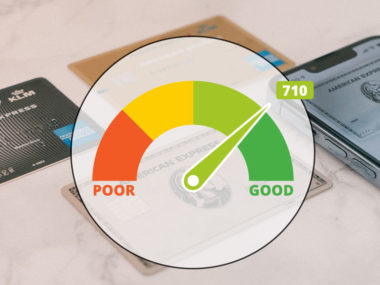First, what is bankruptcy? Bankruptcy means formally declaring you do not have money to pay back your debts. It’s a get-out-of-debt card, but it is by no means free as it negatively impacts your credit score. Before deciding to declare bankruptcy, take a step back and ask whether you should file or not.
Chapters 7 and 13 can affect individuals and are the most common, though Chapters 11 and 12 can also be used by individuals. In any case, declaring bankruptcy wipes out most of your debt (there can be exceptions), with the lenders having to write off the debt you are no longer responsible for paying. For Chapter 13, a payment plan is created to pay back lenders, and thus has slightly better consequences — more on that later.
Table of Contents
How Does Bankruptcy Affect Your Credit?
Generally speaking, filing for bankruptcy is the worst thing you can do to your credit. Credit scores are a measure of how likely and consistent you are in repaying debts. Bankruptcy is a formal way of declaring you cannot pay your debts. As a result, it is a fast and long-lasting way of dropping your record score. How it affects your specific credit score is a bit complicated as it all depends on your history of credit, according to MyFICO.
If you start out with strong credit, say in the 750 to 850 range, then filing will cause your score to plummet. On average, the drop is close to 200 points.
However, if you have poor credit already, due to delinquent payments or a high debt-to-asset ratio, then your credit score might drop only a couple of points. Some publications have even reported a slight upward bump in the credit score of certain individuals, simply because their credit score was that bad. Declaring bankruptcy ended the negative cycle of missed payments and increasing interest and fees; from rock bottom, the only direction to go is up.
Chapter 7 and 13 bankruptcy will both affect your score equally, but some creditors, when looking at your report, might favor one over the other. Since Chapter 13 sets up repayment options, creditors might see this as a sign of responsibility and thus dock fewer points from your score, but that is not a guarantee.
How Long Does Bankruptcy Stay on Your Credit Report?
Once you file for bankruptcy, there’s no turning back. Chapter 7 and 11 filings will follow you for 10 years after the filing date, not the discharge date, and Chapter 13 for seven years on your credit report. These can often get in the way of new credit or loan opportunities, and some job opportunities. However, having the ability to start fresh without debt can be a welcoming change for those that need the extra help.
How to Remove Bankruptcy From Your Credit Report Early
Removing a bankruptcy from your credit report early is a long shot, but it’s still possible. The older the bankruptcy, but before the seven or 10 years, the more likely it becomes. However, before continuing, it’s very important to know that removing a fully accurate, verified bankruptcy before the deletion date specified above is not possible.
First, you will want to get your credit report from all three bureaus. Read the bankruptcy entry carefully. If any part of it is incorrect, dispute the entry. This may result in a deletion from the report.
If everything is correct, ask each bureau to verify the bankruptcy. When they tell you who verified the entry, contact the verifier, likely the court you filed the bankruptcy with.
Should the court tell you they did not verify the bankruptcy with the bureaus, ask for this confirmation in writing, and send a letter to each bureau demanding, under the Fair Credit Reporting Act, to remove the entry as it has not been verified as they claimed. This entire process is likely to take some time, and it may be difficult to get a response from anyone. It will require persistence, and even then, may not work.
It may be helpful to employ a credit repair company to help you. It’s important to note that a legitimate credit repair company will not guarantee removing the bankruptcy entry — remember, it’s a long shot as it is — and will not ask for money up front.
How to Rebuild Credit After Bankruptcy
The road to rebuilding your credit will likely be a long one. As mentioned, even starting with a good credit score, bankruptcy will hurt your credit. However, there are some sure-fire ways to rehabilitate it within a few years time. By adding “positive” credit history to your score, you can see an increase within a four or five year period.
First, visit our credit repair guide. Know that there will be no quick fix, and you will need to work diligently to raise your credit score. Next, consider credit counseling or employing a credit repair company.
You will need to change the habits that originally put you in this position. It might help to look at how people with good credit scores handle financial matters.
Rebuilding Credit After Bankruptcy With Credit Cards
Consider applying for a secured credit card. These types of cards are meant for people trying to build or rebuild credit, and act like a debit card. Most importantly, however, usage is reported to the credit bureaus. While bankruptcy will likely lock you out of using a traditional, or unsecured, credit card for a while as you work on repairing your credit, secured credit cards are mostly intended for people with poor credit as a low-risk tool for credit repair.
It’s still possible to obtain loans with bad credit, but you will face harsher terms. With better habits and paying off the loan on time, you will build credit. By the same token, you can still buy a house or rent an apartment, but expect higher interest rates.
Bankruptcy is an extreme option for debt rehabilitation, a “last resort” for many people in extreme debt. It will negatively impact your credit, as you have proven unable to pay back debts. When paired with other forms of debt rehabilitation – such as secured credit cards, credit repair, or debt consolidation – it can help many people slowly recover from massive debt. Within four to five years you could see a higher score on your report if you work proactively to stay out of debt.
What else can affect your credit? Check out our credit score learning center. If there are errors on your credit report, learn how to contact the credit bureaus and dispute the errors at our template letter resource center.
Image source: https://www.pexels.com/





